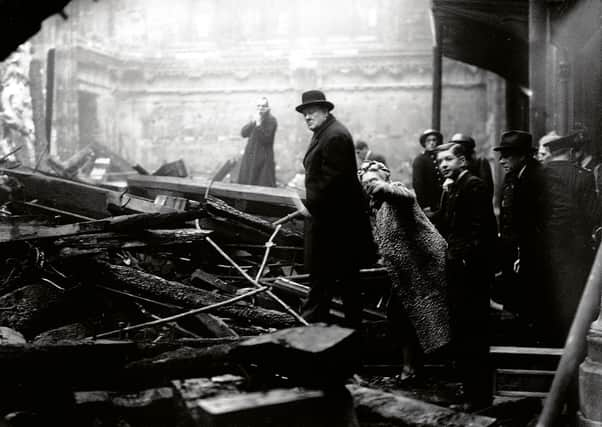Boris Johnson should take care which conflict he conjures up


And now he has his moment. Johnson is invoking the Bulldog Spirit to tackle Covid-19 and has formed the first British war cabinet since the Persian Gulf War. The Prime Minister has made a particular appeal based on his understanding of those values which defined Britain in the Second World War. Or so he thinks.
Cometh the hour, cometh the man? Maybe – but this is a very double-edged sword. Churchill presided over one of the most autocratic periods in British history. Blackouts and food rations were not only mandated but non-compliance punishable by fine or imprisonment.
Advertisement
Hide AdAdvertisement
Hide AdThe British government even brought in the death penalty and life sentences as a deterrent to looting. Hard labour was a regular punishment for black market dealers. The Essential Work Order meant severe penalties for those who were late or absconded from munitions, mining or agriculture duties – conscription ensured no one escaped the risk and realities of wartime.
Waxing lyrical about the “spirit” of those years doesn’t negate their harshness. Salvation came at a cost. Churchill’s draconian measures on the home front, to say nothing of the scuttling of the French fleet in 1942 or the bombing of Dresden in 1945, were necessary evils. They’re not regal vignettes.
If Johnson insists on his war precedents, a better example would be the First World War. That human catastrophe is far less romanticised (an irony for an age that produced some of the country’s most exquisite and most profoundly human poetry from the likes of Siegfried Sassoon and Wilfred Owen). The politicians are half-remembered with no bon mots to their name; the heroes and villains are treated with all the pity of war.
Grandparents stuck in isolation and hoarding are sad. Respiratory disease is a tragedy, not a war effort. A £350-billion-strong stimulus begs the question of why the poor, the disabled, the homeless had to suffer first and foremost during austerity. History looks at the before and after of major conflicts, and it will be looking very closely at this government.
The Blitz was an extreme horror inflicted on the population, but even that evokes a distorted and idealised memory. The First World War is the most 3D war with an all too recognisable human mix of virtues and failings of crime and altruism in equal measure. Not everyone was a utilitarian, and yet not everyone was in it for themselves.
The Prime Minister might well be right to say Churchill was mistrusted and derided before and during the first years of the war. The dots are once again easy to draw. Yet Johnson’s rhetoric not only distorts history but seriously negates the truth about the profound difficulties and extreme curbs on liberty that are on the way.
For over 40 years, growing consumer choice and convenience has been matched by political language articulating individual choice and rights. Neoliberalism might have found a loud voice with Margaret Thatcher, but she merely fired the starting pistol for the decades that followed.
Churchill was the last imperial prime minister, but Johnson presides over one of the most integrated economies in the world. Amazon on your doorstep and Tesco deliveries are the banal backgrounds of Thatcherism’s coup that we take for granted. They’re barely even political topics now.
Advertisement
Hide AdAdvertisement
Hide AdAnd yet, somehow, we seem surprised when the Prime Minister is reluctant to follow in the footsteps of France, Italy or Spain and decide on what is – in all but name – martial law. We seem perplexed that some in our society are ransacking shelves after years of being fed “me, me and me” rhetoric. Britain’s love of liberty and the economic relish has made the prospect of the first long-term curtailment of freedom since the three-day week impossible to imagine.
Quite possibly some strange combination of Europe’s profound experience of fascism and recurring states of emergency in the 20th century has made emergency measures now easier to implement. Not even the privacy versus security debate spawned from the War on Terror can lay a glove on what’s to come. The UK government is stuck considering placing ill, or potentially sick, Britons under house arrest “for their own good”.
That the private sector needs to be prevailed upon to achieve a public good at a time of national emergency is not Churchillian. Necessity is the aim of the game, and we must all do our part. If it needs to be wrapped up in those tropes, we can surely do better. The Black Death led to the Renaissance, the First World War forever expanded the role of women in work and began progress toward an equal society – by obligation and urgency and need.
These are very different times, and yet the Second World War made the modern world. If Churchill returned, it would take him only an hour to apprise himself of an all too familiar place. He would not recognise, but would likely not be surprised, by the state of the Labour Party. The critical link Johnson is missing is Churchill lost the 1945 election to Clement Attlee, who introduced the most sweeping economic and social changes seen since. Labour, in a profound time of national crisis, is between leaders and between ideas.
Civis Britannicus sum is ingrained into this country’s character, but so is a neoliberal strain more potent than Covid-19. To tackle this crisis head-on, the Prime Minister will have to ditch the historical metaphors and look the ugliest mesh of health, politics and economics straight on and decide, and decide now, which is more important.
Heavy is the head that wears the corona.
Comments
Want to join the conversation? Please or to comment on this article.